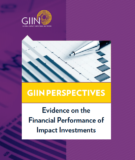
Bron
GIIN
A growing body of data sheds new light on the promising financial performance of impact investments. A new report, GIIN Perspectives: Evidence on the Financial Performance of Impact Investments, published today by the Global Impact Investing Network (GIIN), provides investors with a comprehensive review of available research to date on the financial performance of impact investments. In addition to describing each study, the report synthesizes findings across available research by asset class and surfaces implications for the industry.
Key findings include:
- Impact investors that target market-rate returns can achieve them. Across private market strategies – private equity, fixed income and real assets – the distribution of impact investing fund returns is similar to what is seen in analogous conventional markets. The impact themes pursued by these fund managers include financial inclusion, access to clean energy, sustainable timber, and low-income housing.
- As in conventional markets, performance varies greatly from one fund to the next, indicating that fund manager selection is key to achieving strong returns.
- Not all impact investments seek to achieve market rates of return. Some impact investors intentionally target below-market returns given the nature of their strategies. Concessionary impact investments can be a sustainable funding source for impactful organizations historically reliant solely on grant funding.
- Many impact investors take a portfolio approach to building an impact investment strategy across multiple asset classes in order to meet their overall risk/return preferences.
The report evaluates over a dozen studies on the financial performance of funds in three common asset classes in impact investing: private equity, private debt, and real assets, as well as individual investor portfolios allocated across asset classes. Insights were derived from studies produced by a wide range of organizations, including Cambridge Associates, McKinsey & Company, Wharton Social Impact Initiative, Boston Consulting Group, Symbiotics, EngagedX and Impact Investing Australia, as well as the GIIN, among others.
“Increased transparency around financial performance will enable current players to make more informed portfolio allocation decisions, allow new players to more confidently develop market entry strategies, and allow both to set well-informed performance expectations and more accurately evaluate performance,” said GIIN Research Director Abhilash Mudaliar. “To continue to advance and exponentially scale the industry, active impact investors and other field-builders need to embrace an openness to sharing data on the financial and impact performance of their investments, either directly with the public or by contributing to third-party research.”
The report also identifies gaps in current financial performance research and suggests that future analyses should include: target financial returns across strategies and investors’ abilities to meet them; the performance and role of below-market capital across asset classes; fund and investment performance across asset classes at a more granular geographic and sector level; and the relationship between impact objectives, impact measurement and management practice, and financial returns.






